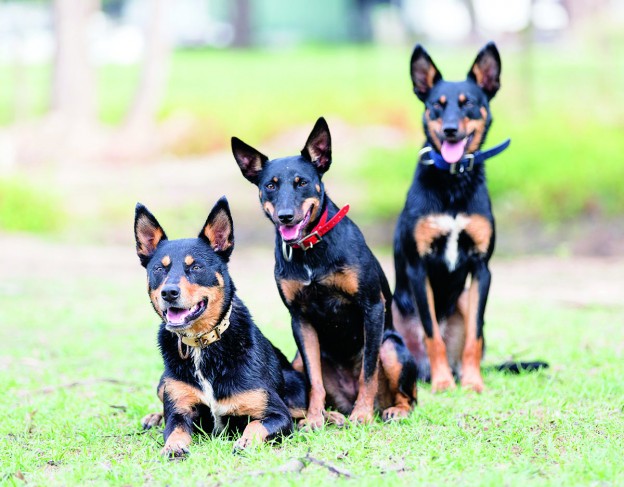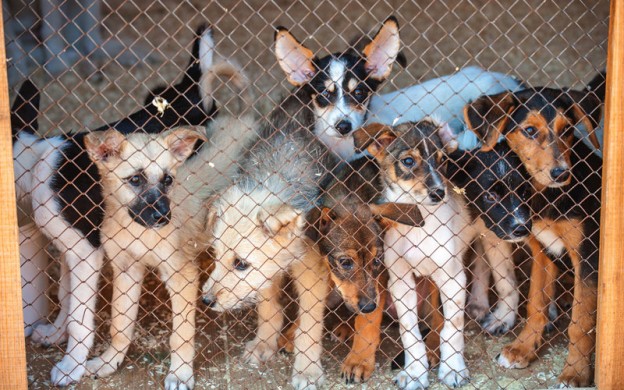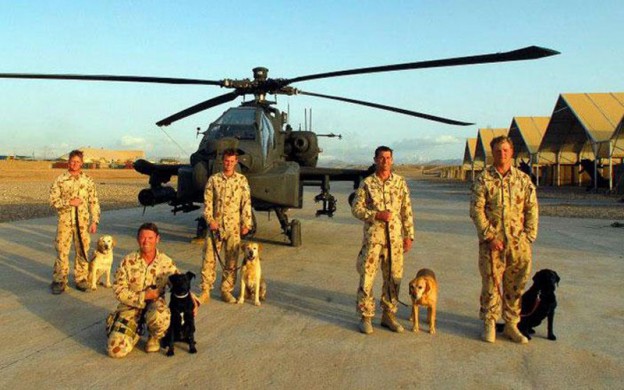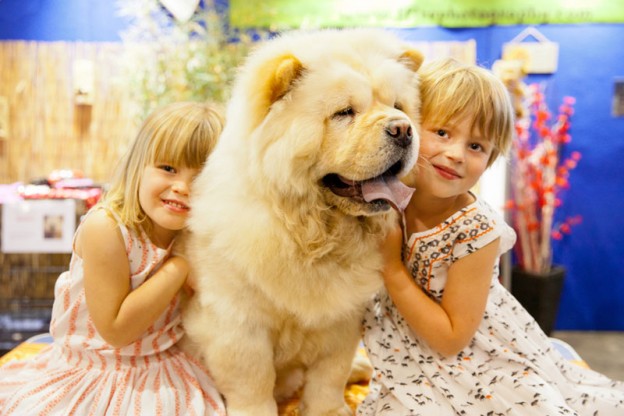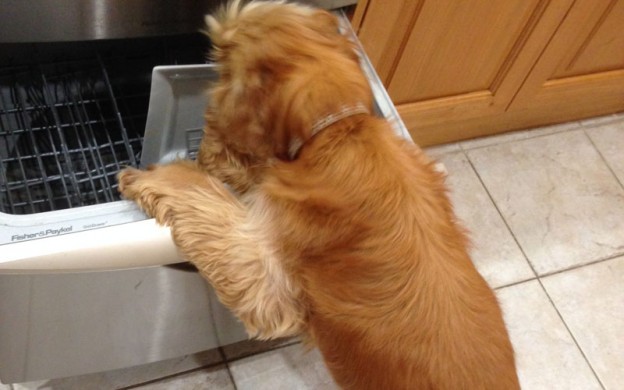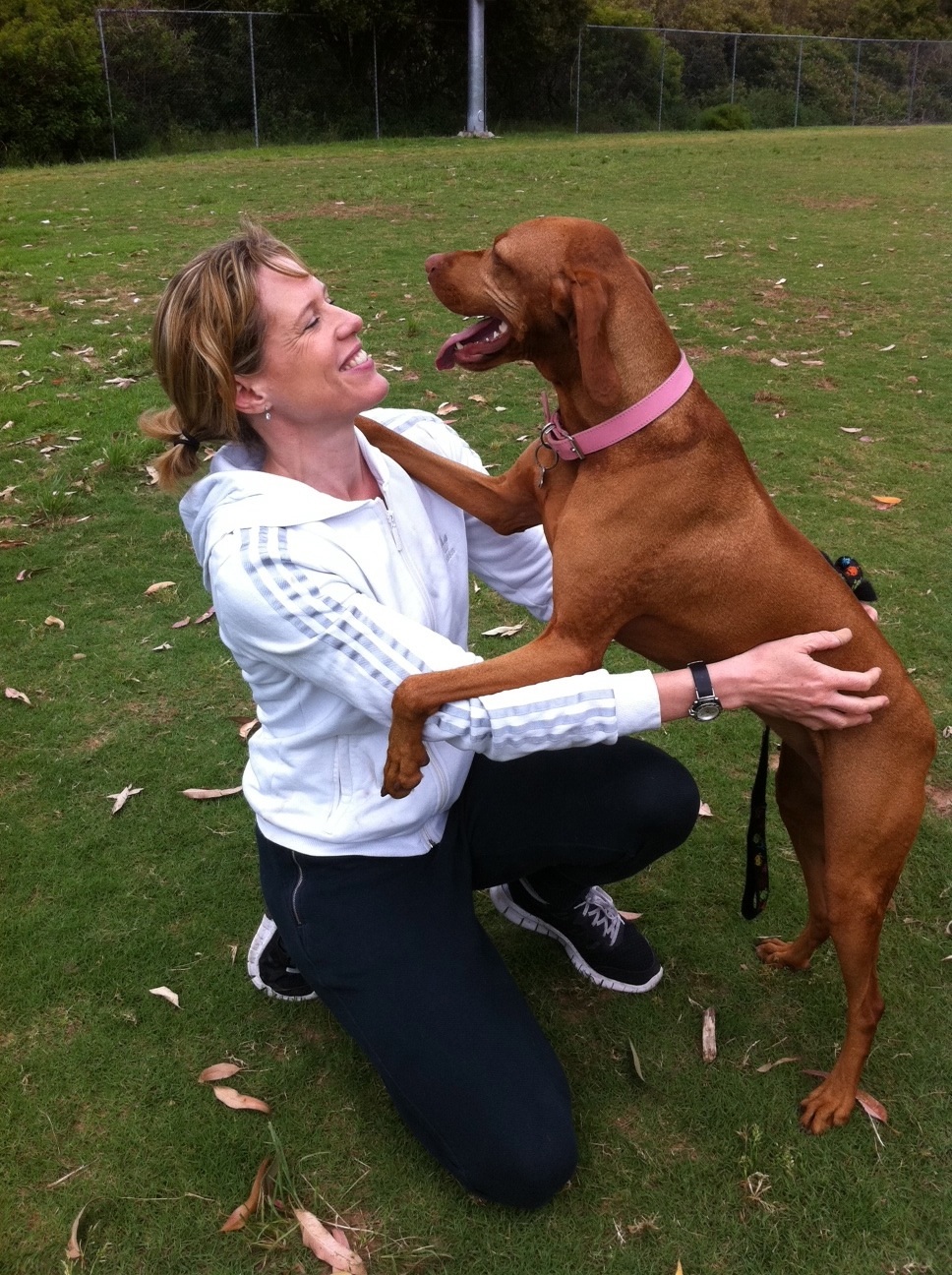
Many dogs fear the word V-E-T, but there are some that will wag their tail as if you had said ‘WALKIES!’ Kylie Baracz meets two of these dogs that love the vet and finds out how they bonded.
Georgina and Nigel are loving dogs who adore people and love being the centre of attention. In saying that, Georgina is quite a sensitive little soul and would not necessarily feel comfortable in any situation. She is very attached to her owner and can get quite nervous around unfamiliar places and other dogs. They have, however, both had to have several procedures done and so their visits to the vet have not always been straightforward.
Nigel
Nigel (also known as “Nigey-Noo”) came to the Boffey family at the age of 16 months, after he failed his first round of assessments with Guide Dogs Australia. He is a blonde Labrador, untraditionally quite tall and very lean.
Jenny Boffey, Nigel’s loving “mum” explains. “Yes, he didn’t make the grade for Guide Dogs Australia, but how lucky for us! He came to us fully trained and out of that ‘naughty puppy’ stage.”
Although Nigel is trained, he has a few imperfections. “Nigel is a guts. Loving his food is an understatement. He’s placid when resting, very cheeky, loving, a big sook and truly is his mum’s shadow. He loves to carry a soft toy around or his plastic sausages which he is renowned for at the local dog park. He definitely enriches our lives and makes our family complete,” says Jenny.
From the moment Nigel laid eyes on Dr Martine Perkins, it was love at first sight. Dr Perkins has been the Boffey family’s chosen vet now for over five years. “Mickey, also a blonde Labrador from the Guide Dogs Association, was Nigel’s predecessor and was also under the very capable hands of Martine. No matter what Martine has had to do to Nigel to make him better when ill, he still goes crazy every time he sees her and showers her with unconditional love. Nigel definitely picks up on her gentle, caring nature,” says Jenny.
“If we took Nigel to another vet, he would be looking everywhere for Martine. He even knows when we’re near the Pymble Veterinary Clinic, pacing in the back of the car. He has no fear of going to the vets if Martine is on hand. We have and will follow Martine to wherever her career takes her. She and her wonderful staff ensure your dog’s visit to the vet will be nothing but enjoyable.”
The Boffey family found they didn’t need to use any calming or soothing techniques on Nigel, he just loved Dr Perkins from day one. Jenny does believe it may have been because of the care he received as a puppy. “I am sure that the experienced Guide Dog trainers and puppy raisers mastered this with Nigel in their hands.”
The Boffey family cannot imagine going anywhere else, now that Dr Perkins is their vet. “From our wonderful experience and journey with Martine being our vet, we are constantly impressed with her depth of knowledge, her unconditional love for any animal that crosses her path, her dedication to her career and those in her care, her great sense of humour and her utmost compassion when the need arises. This lady will go to any length necessary to care for your pet and their wellbeing.”
Georgina
Georgina is a four-and-a-half year old female de-sexed Hungarian Vizsla. Like most Vizslas, she has a really great temperament and generally loves people more than other dogs. However, she probably loves her vet most of all.
“We took Georgina, back then aged probably 10 weeks, to the local vet as soon as we had brought her home from the breeder, for a preliminary check-up. Martine actually had helped me to evaluate the dog’s breeding background, so was looking forward to meeting the puppy. It was love at first sight. Georgina never hesitated at all, even though the vet’s surgery was totally new to her. She waggled her little tail, jumped up on the vet, licked her face and then stood stock-still on the table to be checked out,” says Heide Skelton, Georgina’s happy owner.
Dr Perkins has been Georgina’s vet for all of her life, with the Skelton family following her from practice to practice. “Before Martine started the Pymble Vet Clinic, she worked with the local vet about five minutes away from me, which is where I took Georgina for the first three years or so of her life,” says Heide. “Georgina, however, never showed any reluctance to be checked by the other vet working there on Martine’s day off and absolutely loved the vet nurses. She also now loves the vet nurses at the new clinic.”
Georgina, like many Vizsla puppies, was very excitable when she first arrived at the vet clinic with the Skeltons, and the family generally tried to keep things calm around her. “I was also very excited about showing off the new puppy and even at that tender age, she would have picked up on that. More than anything I did, I feel it was Martine’s genuine love and steady hands that made the puppy feel so safe,” says Heide.
“I feel that I had very little to do with the fact that my dog is happy (ecstatic in fact!) to go to the vet. I believe it is the vet and how he/she approached the animal that is the crucial factor here. Georgina has never received anything but love — and maybe the occasional prick of a needle — from her favourite vet.”
Finding that special bond
There will always be dogs that, no matter what vets do, will just not be able to settle in a veterinary clinic situation and will try to be aggressive.
“This is always a difficult situation for everyone involved as it is hard for an owner to see their pet distressed and obviously we cannot allow ourselves to get bitten,” says Dr Perkins. “At the same time, we don’t want to inflict unnecessary restraint or stress on our patients. Occasionally, a house call can be the answer but often this is not the case. Sometimes we might need to place a muzzle on a dog in order to examine them and assess a situation. Occasionally, some owners actually bring their own muzzle to place on the dog as they arrive. Once muzzled, often these dogs are relatively accepting of the situation.”
Dr Perkins tries not to be confrontational with her patients and always takes the time to say hello and greet each dog when they arrive.
“We make sure that nervous dogs are not left waiting too long in an unfamiliar situation. If there is going to be a wait, we always offer for people to go for a little walk and we will come out to get them when we are ready. We try to minimise the ‘white coat’ effect by having a comfortable surrounding with a nice rubber-lined examination table instead of stainless steel,” says Dr Perkins.
“We always have treats for those dogs that are allowed them and our lovely nurses always try to make sure they recognise and greet each dog in a friendly way. We make notes on individual dog’s little personality traits so that we can try to be prepared for each one. I think, however, the main thing is that we truly love all our patients and we love our profession, and hopefully most pets pick up on this.”
Five top tips for your next visit
Dr Martine Perkins has five tops tips to get your dog comfortable and happy for those nervous vet visits.
- If your dog is an anxious or nervous dog or has any peculiar personality traits, you should letting the nursing staff and veterinarian know about this so they can try to minimise any stressful situations. We are pretty good at what we do, but once a pet is scared and things have escalated, it can be very hard to reverse that effect.
- If you have an easy to access local veterinary clinic which you go past on your regular daily walk, it’s a great idea to pop in for a regular weight check and treat! That way they get to associate the clinic with a pleasant experience and not always a bad one. There’s nothing like positive reinforcement!
- If you have a new puppy, a great way to socialise them and familiarise themselves with the veterinary clinic can be at puppy classes. A lot of vets will hold puppy classes at their clinics. This can be a really fun experience for everyone involved!
- Not all dogs will like the vet no matter what you do, but hopefully most of them will cope just fine if everyone remains calm and relaxed. Dogs pick up on their owner’s tension and anxiety so it helps to keep them calm.
- Very occasionally, a veterinarian may ask to take your dog out of the consultation room to get a nurse to assist them with an examination or giving some medicine. Although this may worry an owner, sometimes it really is the best way. Some dogs are just so much more difficult to handle when their owner is nearby and they can really get themselves worked up into quite a state. When we take them away from their owner, quite often they no longer struggle and so a very simple injection can be given which might have been traumatic had they not been removed from their owner. In this case, I guess you really do need to trust your vet. We do this job because we love it and because we care about our patients. We would never want to inflict any further stress or harm on your pet than is necessary.



